新标准大学英语三unit1 词汇句子
- 格式:ppt
- 大小:855.00 KB
- 文档页数:26
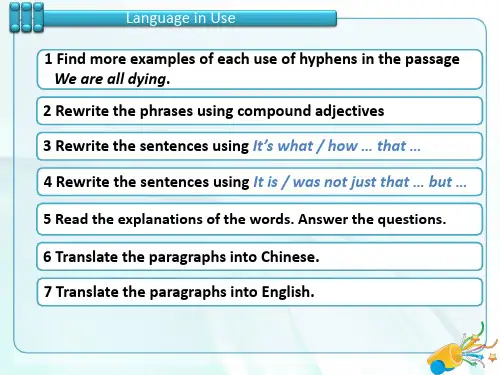
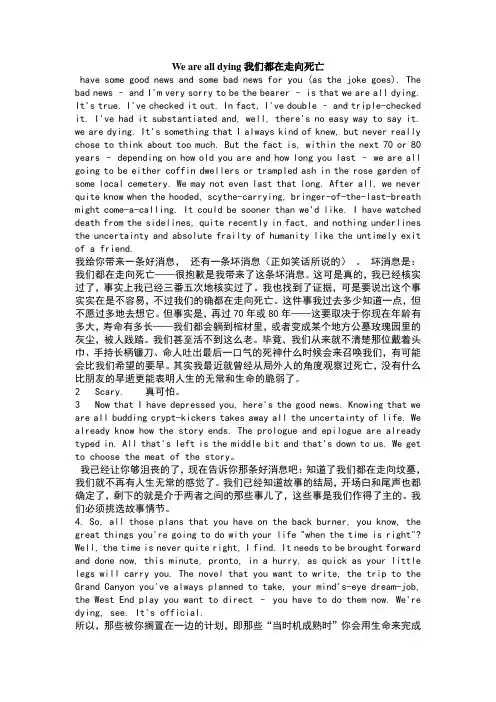
We are all dying我们都在走向死亡have some good news and some bad news for you (as the joke goes). The bad news –and I'm very sorry to be the bearer –is that we are all dying. It's true. I've checked it out. In fact, I've double –and triple-checked it. I've had it substantiated and, well, there's no easy way to say it. we are dying. It's something that I always kind of knew, but never really chose to think about too much. But the fact is, within the next 70 or 80 years –depending on how old you are and how long you last – we are all going to be either coffin dwellers or trampled ash in the rose garden of some local cemetery. We may not even last that long. After all, we never quite know when the hooded, scythe-carrying, bringer-of-the-last-breath might come-a-calling. It could be sooner than we'd like. I have watched death from the sidelines, quite recently in fact, and nothing underlines the uncertainty and absolute frailty of humanity like the untimely exit of a friend.我给你带来一条好消息,还有一条坏消息(正如笑话所说的)。
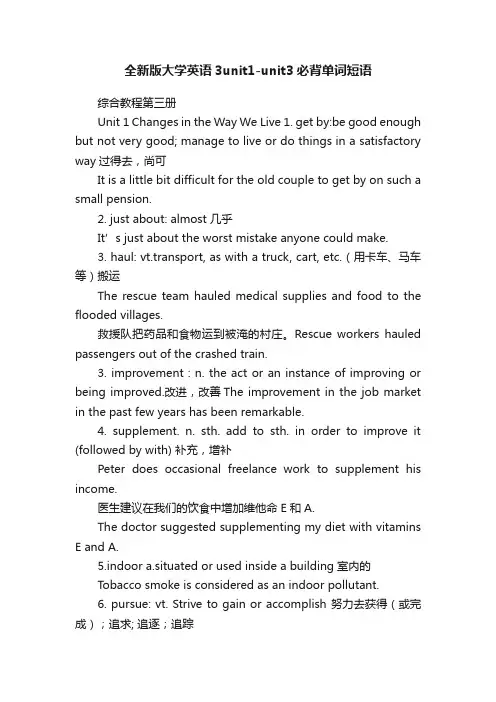
全新版大学英语3unit1-unit3必背单词短语综合教程第三册Unit 1 Changes in the Way We Live 1. get by:be good enough but not very good; manage to live or do things in a satisfactory way过得去,尚可It is a little bit difficult for the old couple to get by on such a small pension.2. just about: almost 几乎It’s just about the worst mistake anyone could make.3. haul: vt.transport, as with a truck, cart, etc.(用卡车、马车等)搬运The rescue team hauled medical supplies and food to the flooded villages.救援队把药品和食物运到被淹的村庄。
Rescue workers hauled passengers out of the crashed train.3. improvement:n. the act or an instance of improving or being improved.改进,改善The improvement in the job market in the past few years has been remarkable.4. supplement. n. sth. add to sth. in order to improve it (followed by with) 补充,增补Peter does occasional freelance work to supplement his income.医生建议在我们的饮食中增加维他命E 和A.The doctor suggested supplementing my diet with vitaminsE and A.5.indoor a.situated or used inside a building室内的Tobacco smoke is considered as an indoor pollutant.6. pursue: vt. Strive to gain or accomplish 努力去获得(或完成);追求; 追逐;追踪People earn a living during the day and pursue vocational and intellectual interests in their spare time.The police are pursuing an escaped prisoner.7. wicked:evil or bad邪恶的,坏的We are all born good, but can be taught to be wicked.8.get through:come successfully to the end通过,度过She got through the entrance examination and was accepted by the college.9. at that point: at that very moment; rightthen就在那时The train was now only a couple of yardsfrom the kids on the track. At that point,Anthony threw himself forward andpulled them clear.10. on balance: with all things considered总的来说I think, on balance, I prefer the newoperating system.我想,总的来说我更喜欢新的操作系统。
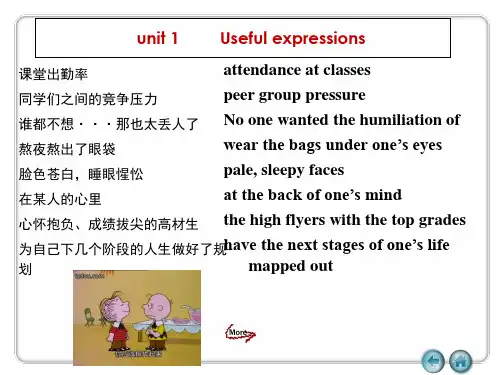
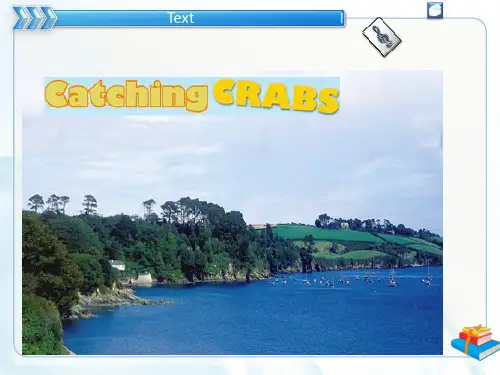
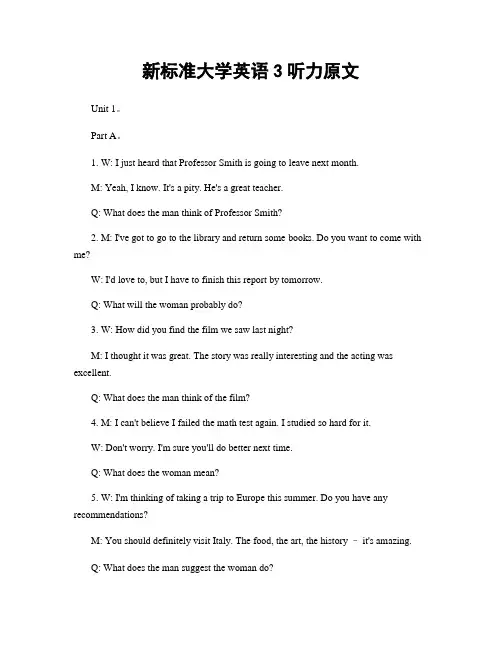
新标准大学英语3听力原文Unit 1。
Part A。
1. W: I just heard that Professor Smith is going to leave next month.M: Yeah, I know. It's a pity. He's a great teacher.Q: What does the man think of Professor Smith?2. M: I've got to go to the library and return some books. Do you want to come with me?W: I'd love to, but I have to finish this report by tomorrow.Q: What will the woman probably do?3. W: How did you find the film we saw last night?M: I thought it was great. The story was really interesting and the acting was excellent.Q: What does the man think of the film?4. M: I can't believe I failed the math test again. I studied so hard for it.W: Don't worry. I'm sure you'll do better next time.Q: What does the woman mean?5. W: I'm thinking of taking a trip to Europe this summer. Do you have any recommendations?M: You should definitely visit Italy. The food, the art, the history – it's amazing.Q: What does the man suggest the woman do?Part B。
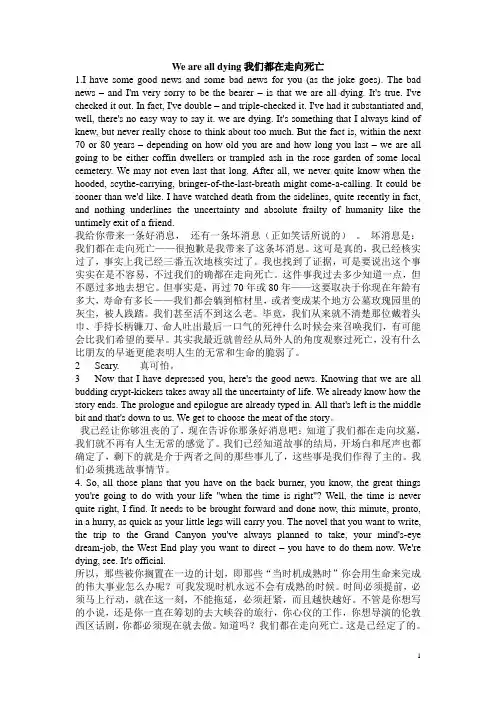
We are all dying我们都在走向死亡1.I have some good news and some bad news for you (as the joke goes). The bad news – and I'm very sorry to be the bearer – is that we are all dying. It's true. I've checked it out. In fact, I've double – and triple-checked it. I've had it substantiated and, well, there's no easy way to say it. we are dying. It's something that I always kind of knew, but never really chose to think about too much. But the fact is, within the next 70 or 80 years – depending on how old you are and how long you last – we are all going to be either coffin dwellers or trampled ash in the rose garden of some local cemetery. We may not even last that long. After all, we never quite know when the hooded, scythe-carrying, bringer-of-the-last-breath might come-a-calling. It could be sooner than we'd like. I have watched death from the sidelines, quite recently in fact, and nothing underlines the uncertainty and absolute frailty of humanity like the untimely exit of a friend.我给你带来一条好消息,还有一条坏消息(正如笑话所说的)。
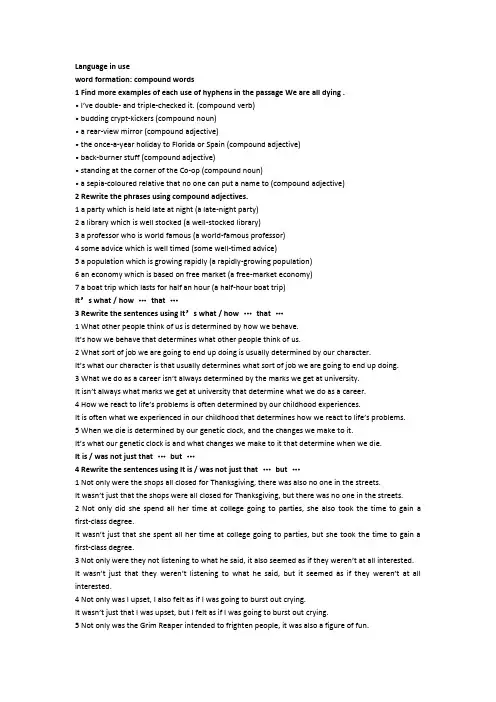
Language in useword formation: compound words1 Find more examples of each use of hyphens in the passage We are all dying .• I’ve double- and triple-checked it. (compound verb)• budding crypt-kickers (compound noun)• a rear-view mirror (compound adjective)• the once-a-year holiday to Florida or Spain (compound adjective)• back-burner stuff (compound adjective)• standing at the corner of the Co-op (compound noun)• a sepia-coloured relative that no one can put a name to (compound adjective)2 Rewrite the phrases using compound adjectives.1 a party which is held late at night (a late-night party)2 a library which is well stocked (a well-stocked library)3 a professor who is world famous (a world-famous professor)4 some advice which is well timed (some well-timed advice)5 a population which is growing rapidly (a rapidly-growing population)6 an economy which is based on free market (a free-market economy)7 a boat trip which lasts for half an hour (a half-hour boat trip)It’s what / how …that …3 Rewrite the sentences using It’s what / how …that …1 What other people think of us is determined by how we behave.It’s how we behave that determines what other people think of us.2 What sort of job we are going to end up doing is usually determined by our character.It’s what our character is that usually determines what sort of job we are going to end up doing.3 What we do as a career isn’t always determined by the marks we get at university.It isn’t always what marks we get at university that determine what we do as a career.4 How we react to life’s problems is often determined by our childhood experiences.It is often what we experienced in our childhood that determines how we react to life’s problems.5 When we die is determined by our genetic clock, and the changes we make to it.It’s what our genetic clock is and what changes we make to it that determine when we die.It is / was not just that …but …4 Rewrite the sentences using It is / was not just that …but …1 Not only were the shops all closed for Thanksgiving, there was also no one in the streets.It wasn’t just that the shops were all closed for Thanksgiving, but there was no one in the streets.2 Not only did she spend all her time at college going to parties, she also took the time to gain a first-class degree.It wasn’t just that she spent all her time at college going to parties, but she took the time to gain a first-class degree.3 Not only were they not listening to what he said, it also seemed as if they weren’t at all interested. It wa sn’t just that they weren’t listening to what he said, but it seemed as if they weren’t at all interested.4 Not only was I upset, I also felt as if I was going to burst out crying.It wasn’t just that I was upset, but I felt as if I was going to burst out crying.5 Not only was the Grim Reaper intended to frighten people, it was also a figure of fun.It wasn’t just that the Grim Reaper was intended to frighten people, but it was also a figure of fun. collocations5 Read the explanations of the words. Answer the questions.1 settle When you settle somewhere you go there to stay.(a) Where is dust likely to settle in a roomOn the surfaces that aren’t used very often or aren’t cleaned.(b) If you settle an argument, is the conclusion satisfactoryYes, it is, because the disagreement is solved and each party is satisfied with the outcome.(c) If you settle the bill, what is there left to payNothing, because you have paid everything that is owed.(d) What do you do when you settle back to watch a filmWe relax in a comfortable chair and enjoy it.2 smooth This word can mean flat or soft, comfortable, easy or confident.(a) If the sea is smooth, are you likely to feel seasickNo, because the sea is calm. We will feel seasick if it is rough.(b) If a changeover from one government to the next is smooth, are there lots of problemsNo, because the changeover has gone well, without difficulties.(c) Is it a good idea to trust a smooth talkerNot necessarily, because some people who talk confidently like that do so to trick you, like a confidence trickster or conman.3 offer This word can refer to something you would like someone to take, something someone gives, or something that is for sale.(a) If you decline an offer, do you say “yes” or “no”We say “no”, because we are refusing it.(b) If you offer an apology to someone for something you have done, what do you sayWe should say, “I apologize” or “I’m sorry”.(c) Where are you likely to see special offerIn a shop, because the shop is offering a special price or reduction for something.(d) If someone has a lot to offer, what kind of person are theyThey are intelligent, talented, gifted or creative and they will bring these kinds of qualities to their work.4 bear If you bear something you carry or bring it. If you cannot bear something, you dislike it or cannot accept it.(a) If you bear something in mind, do you forget itNo, we will remember it and consider it for a particular occasion in future.(b) If you bear a resemblance to someone, in what way are you like themWe look similar in certain physical features.(c) Is there anything you can’t bear to think aboutI can’t bear to think too much about some of the problems in the world, famine, war, poverty etc. In the modern world, why don’t we just solve them5 resistance This word can refer to the refusal to accept something new, the ability not to be harmed by something, or opposition to someone or something.(a) If there is resistance to an idea, do people accept itNo, not easily. They refuse to accept the idea ma ybe because it’s just a bad idea, or they may changetheir mind if they understand it better.(b) If the soldiers met with resistance, what happenedThe soldiers met opposition from those they were fighting against.(c) Is there a way to build up your resistance to coldYes, we can keep ourselves as healthy as possible with a good diet and getting enough exercise sothat we are less likely to catch a cold, or if we do get one, we won’t suffer so badly.6 Translate the paragraphs into Chinese.1 We all sensed we were coming to the end of our stay here, that we would never get a chance like this again, and we became determined not to waste it. Most important of course were the final exams in April and May in the following year. No one wanted the humiliation of finishing last in class, so the peer group pressure to work hard was strong. Libraries which were once empty after five o’clock in the afternoon were standing room only until the early hours of the morning, and guys wore the bags under their eyes and their pale, sleepy faces with pride, like medals proving their diligence. (☞and guys wore the bags under their eyes and their pale, sleepy faces with pride … 这句的动词wear 后面带两个宾语,中文找不到能带这两个宾语的动词,故处理成四个中文短句;翻译like medals proving their diligence时,采用“增词法”增加“这些”来概括前面所描写的“眼袋”,“脸色苍白”,“睡眼惺忪”等,使译文含义更加清晰流畅。
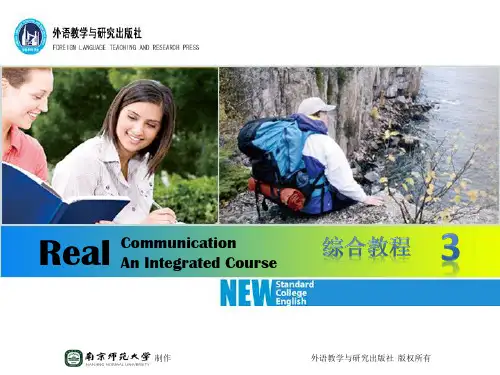
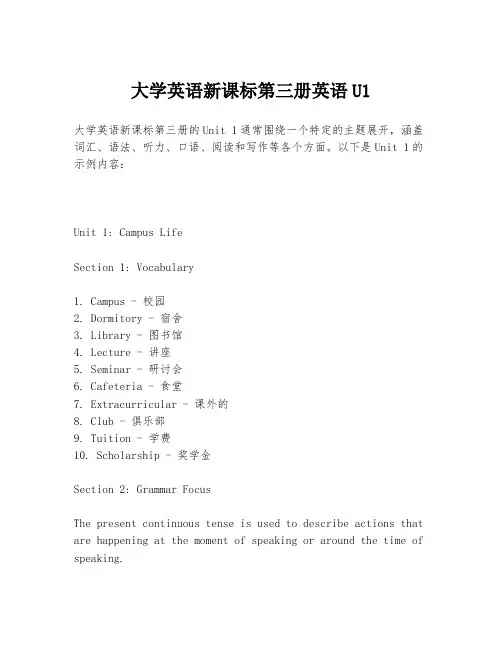
大学英语新课标第三册英语U1大学英语新课标第三册的Unit 1通常围绕一个特定的主题展开,涵盖词汇、语法、听力、口语、阅读和写作等各个方面。
以下是Unit 1的示例内容:Unit 1: Campus LifeSection 1: Vocabulary1. Campus - 校园2. Dormitory - 宿舍3. Library - 图书馆4. Lecture - 讲座5. Seminar - 研讨会6. Cafeteria - 食堂7. Extracurricular - 课外的8. Club - 俱乐部9. Tuition - 学费10. Scholarship - 奖学金Section 2: Grammar FocusThe present continuous tense is used to describe actions that are happening at the moment of speaking or around the time of speaking.- Affirmative: Subject + is/am/are + present participle of the verb.- Negative: Subject + is/am/are + not + present participle of the verb.- Question: Is/Am/Are + subject + present participle of the verb?Section 3: Listening ComprehensionListen to a dialogue between two students discussing their campus life. Answer the following questions:- What time does the library close?- Which club are they interested in joining?- What is the name of the professor giving the lecture?Section 4: Speaking ActivityRole-play a conversation between a new student and a senior student. The new student should ask about campus facilities, classes, and extracurricular activities. The senior student should provide information and advice.Section 5: Reading ComprehensionRead the following passage about adjusting to university life and answer the comprehension questions:- What are some common challenges faced by new students?- How can students make friends on campus?- What resources are available to help students succeed academically?Section 6: Writing TaskWrite an essay on "The Benefits of Participating in Campus Activities." Discuss the following points:- Social benefits- Academic benefits- Personal developmentSection 7: Cultural NoteLearn about the history and significance of a traditional campus event in the United States, such as Homecoming.请注意,以上内容仅为示例,具体教材的Unit 1内容可能会有所不同。
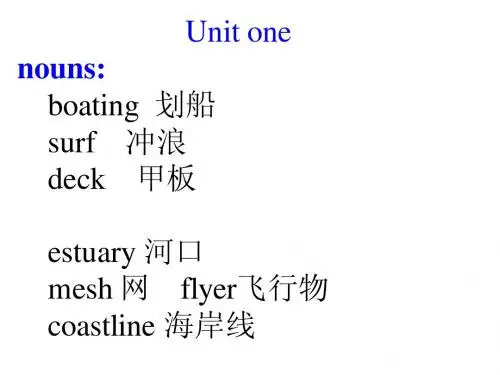
We are all dying我们都在走向死亡1.I have some good news and some bad news for you (as the joke goes). The bad news – and I'm very sorry to be the bearer – is that we are all dying. It's true. I've checked it out. In fact, I've double – and triple-checked it. I've had it substantiated and, well, there's no easy way to say it. we are dying. It's something that I always kind of knew, but never really chose to think about too much. But the fact is, within the next 70 or 80 years – depending on how old you are and how long you last – we are all going to be either coffin dwellers or trampled ash in the rose garden of some local cemetery. We may not even last that long. After all, we never quite know when the hooded, scythe-carrying, bringer-of-the-last-breath might come-a-calling. It could be sooner than we'd like. I have watched death from the sidelines, quite recently in fact, and nothing underlines the uncertainty and absolute frailty of humanity like the untimely exit of a friend.我给你带来一条好消息,还有一条坏消息(正如笑话所说的)。
Catching Crabs1 In the fall of our final year, our mood changed. the relaxed atmosphere of the preceding summer semester, the impromptu ball games, the boating on the Charles River, the late-night parties had disappeared, and we all started to get our heads down, studying late, and attendance at classes rose steeply again. We all sensed we were coming to the end of our stay here, that we would never get a chance like this again, and we became determined not to waste it. Most important of course were the final exams in April and May in the following year. No one wantedthe humiliation of finishing last in class, so the peer group pressure to work hard was strong. Libraries which were once empty after five o'clock in the afternoon were standing room only untilthe early hours of the morning, and guys wore the bags under their eyes and their pale, sleepy faces with pride, like medals proving their diligence.大学最后一年的秋天,我们的心情变了。
Unit1Inside ViewConversation1Janet:Hi,it’s me again,Janet Li.I’m still a student at the University of Oxford in England.But I’m not in Oxford right now.And I haven’t gone back home to China either.It’s the long vacation now,and believe it or not,it’s the middle of summer.I’m spending my summer in one of the world’s greatest cities.I’m in London,home to the Houses of Parliament,Big Ben,Tower Bridge…and the double-decker bus.I want to find out what it’s like to live in this busy,lively city.So I’m working for London Time Off,a website about what’s on in London.This is Joe…,he’s my boss,and this is Andy, who is a reporter.And what’s my job?Well,I don’t know yet,because it’s my first day.But I’m meant to be shadowing Andy,oh,what I mean is,I’m going to be helping him.So can you tell me something about London,Andy?Andy:It’s the greatest city in the world..Joe:Except for New York!Andy:New York?Don’t make me laugh!Joe:And your point is…?Andy:Look,if you want my opinion,London is greater than New York…Joe:No,I don’t want your opinion,thank you very much.It’s a fact.Andy:A fact!Are you serious?\Janet:And here we are in London,probably the greatest city in the world.Andy:What?Probably?Excuse me,I prefer to deal with this myself…Joe:Ah,dream on,Andy………珍妮特:嗨,又是我,珍妮特.李。
Language in useword formation: compound words1 Find more examples of each use of hyphens in the passage We are all dying .• I’ve double- and triple-checked it. (compound verb)• budding crypt-kickers (compound noun)• a rear-view mirror (compound adjective)• the once-a-year holiday to Florida or Spain (compound adjective)• back-burner stuff (compound adjective)• standing at the corner of the Co-op (compound noun)• a sepia-coloured relative that no one can put a name to (compound adjective)2 Rewrite the phrases using compound adjectives.1 a party which is held late at night (a late-night party)2 a library which is well stocked (a well-stocked library)3 a professor who is world famous (a world-famous professor)4 some advice which is well timed (some well-timed advice)5 a population which is growing rapidly (a rapidly-growing population)6 an economy which is based on free market (a free-market economy)7 a boat trip which lasts for half an hour (a half-hour boat trip)It’s what / how …that …3 Rewrite the sentences using It’s what / how …that …1 What other people think of us is determined by how we behave.It’s how we behave that determines what other people think of us.2 What sort of job we are going to end up doing is usually determined by our character.It’s what our character is that usually determines what sort of job we are going to end up doing.3 What we do as a career isn’t always determined by the marks we get at university.It isn’t always what marks we get at university that determine what we do as a career.4 How we react to life’s problems is often determined by our childhood experiences.It is often what we experienced in our childhood that determines how we react to life’s problems.5 When we die is determined by our genetic clock, and the changes we make to it.It’s what our genetic clock is and what changes we make to it that determine when we die.It is / was not just that …but …4 Rewrite the sentences using It is / was not just that …but …1 Not only were the shops all closed for Thanksgiving, there was also no one in the streets.It wasn’t just that the shops were all closed for Thanksgiving, but there was no one in the streets.2 Not only did she spend all her time at college going to parties, she also took the time to gain a first-class degree.It wasn’t just that she spent all her time at college going to parties, but she took the time to gain a first-class degree.3 Not only were they not listening to what he said, it also seemed as if they weren’t at all interested.It wa sn’t just that they weren’t listening to what he said, but it seemed as if they weren’t at all interested.4 Not only was I upset, I also felt as if I was going to burst out crying.It wasn’t just that I was upset, but I felt as if I was going to burst out crying.5 Not only was the Grim Reaper intended to frighten people, it was also a figure of fun.It wasn’t just that the Grim Reaper was intended to frighten people, but it was also a figure of fun. collocations5 Read the explanations of the words. Answer the questions.1 settle When you settle somewhere you go there to stay.(a) Where is dust likely to settle in a room?On the surfaces that aren’t used very often or aren’t cleaned.(b) If you settle an argument, is the conclusion satisfactory?Yes, it is, because the disagreement is solved and each party is satisfied with the outcome.(c) If you settle the bill, what is there left to pay?Nothing, because you have paid everything that is owed.(d) What do you do when you settle back to watch a film?We relax in a comfortable chair and enjoy it.2 smooth This word can mean flat or soft, comfortable, easy or confident.(a) If the sea is smooth, are you likely to feel seasick?No, because the sea is calm. We will feel seasick if it is rough.(b) If a changeover from one government to the next is smooth, are there lots of problems?No, because the changeover has gone well, without difficulties.(c) Is it a good idea to trust a smooth talker?Not necessarily, because some people who talk confidently like that do so to trick you, like a confidence trickster or conman.3 offer This word can refer to something you would like someone to take, something someone gives, or something that is for sale.(a) If you decline an offer, do you say “yes” or “no”?We say “no”, be cause we are refusing it.(b) If you offer an apology to someone for something you have done, what do you say?We should say, “I apologize” or “I’m sorry”.(c) Where are you likely to see special offer?In a shop, because the shop is offering a special price or reduction for something.(d) If someone has a lot to offer, what kind of person are they?They are intelligent, talented, gifted or creative and they will bring these kinds of qualities to their work.4 bear If you bear something you carry or bring it. If you cannot bear something, you dislike it or cannot accept it.(a) If you bear something in mind, do you forget it?No, we will remember it and consider it for a particular occasion in future.(b) If you bear a resemblance to someone, in what way are you like them?We look similar in certain physical features.(c) Is there anything you can’t bear to think about?I can’t bear to think too much about some of the problems in the world, famine, war, poverty etc. In the modern world, why don’t we just solv e them?5 resistance This word can refer to the refusal to accept something new, the ability not to be harmed by something, or opposition to someone or something.(a) If there is resistance to an idea, do people accept it?No, not easily. They refuse to ac cept the idea maybe because it’s just a bad idea, or they may change their mind if they understand it better.(b) If the soldiers met with resistance, what happened?The soldiers met opposition from those they were fighting against.(c) Is there a way to build up your resistance to cold?Yes, we can keep ourselves as healthy as possible with a good diet and getting enough exercise so that we are less likely to catch a cold, or if we do get one, we won’t suffer so badly.6 Translate the paragraphs into Chinese.1 We all sensed we were coming to the end of our stay here, that we would never get a chance like this again, and we became determined not to waste it. Most important of course were the final exams in April and May in the following year. No one wanted the humiliation of finishing last in class, so the peer group pressure to work hard was strong. Libraries which were once empty after five o’clock in the afternoon were standing room only until the early hours of the morning, and guys wore the bags under their eyes and their pale, sleepy faces with pride, like medals proving their diligence. (☞and guys wore the bags under their eyes and their pale, sleepy faces with pride … 这句的动词wear 后面带两个宾语,中文找不到能带这两个宾语的动词,故处理成四个中文短句;翻译like medals proving their diligence时,采用“增词法”增加“这些”来概括前面所描写的“眼袋”,“脸色苍白”,“睡眼惺忪”等,使译文含义更加清晰流畅。
新标准大学英语综合教程3第一单元:Traveling单词学习ndscape n.风景,景色–The landscape in that area is breathtakingly beautiful.•那个地区的风景美得令人惊叹。
2.attraction n.景点,吸引力–The Great Wall is a popular tourist attraction in China.•长城是中国的一个热门旅游景点。
3.itinerary n.旅行计划,行程安排–Please let me know your itinerary for the trip.•请告诉我你的旅行计划。
课文阅读•Traveling is an important aspect of people’s lives. It allows them to experience new cultures, explore different landscapes, and visit famous attractions around the world.•An ideal itinerary for a trip usually includes a mix of well-known tourist spots and hidden gems. The former includes popular attractions such as the Eiffel Tower in Paris, the Great Wall in China, and the Statue of Liberty in the United States. These landmarks are significant to their respective countries and are visited by millions of tourists every year.•On the other hand, exploring hidden gems is becoming more popular among travelers. These are lesser-known attractions that are off the beaten path and offer a unique cultural experience. Travelers can enjoy the tranquility of a secluded beach, hike through untouched forests, or visit a local market to immerse themselves in the local lifestyle.•In addition to visiting attractions, traveling also allows people to try new foods and experience different cuisines. Each region has its own traditional dishes and flavors that are worth exploring. Trying local street food can be an adventure in itself, as it gives a glimpse into the daily lives of the locals.•Traveling is not just about sightseeing and trying new foods; it also provides an opportunity for personal growth. It enables individuals to step out of their comfort zones, adapt to new environments, and learn to communicate with people from different backgrounds. These experiences can lead to a broader perspective and a deeper understanding of the world.课后练习1.Fill in the blank with the appropriate word from the box below:itinerary, landscape, attractionThe Grand Canyon is a famous attraction in the United States with breathtaking landscape.2.Answer the following questions:–What are some popular tourist attractions mentioned in the passage?–Why is trying local street food mentioned as an important part of traveling?–How can traveling contribute to personal growth?参考答案1.The Grand Canyon is a famous attraction in the United States with breathtaking landscape.–Some popular tourist attractions mentioned in the passage include the Eiffel Tower in Paris, the Great Wall in China, and the Statueof Liberty in the United States.–Trying local street food is mentioned as an important part of traveling because it allows travelers to experience the local culture andcuisine, and provides insight into the everyday lives of the locals.–Traveling can contribute to personal growth by pushing individuals out of their comfort zones, exposing them to newenvironments and cultures, and allowing them to developcommunication and adaptability skills. It can also lead to a broaderperspective and a deeper understanding of the world.。
新标准大学英语_综合教程3_课后答案unit1Unit 1Active reading (1)Catching crabsLanguage points1 … and we all started to get our heads down … (Para 1)To get one’s head down means to concentrate and focus on studying. In other British informal contexts,it can mean to sleep. Note also, to keep one’s head down means to continue to do something quietly,especially when there is trouble happening around you.Unit 1 Discovering yourself2 Most important of course were the final exams in April and May in the following year. (Para 1)This is a conversational elliptical sentence. A standard way of saying this is: The most important things,of course, were the final exams in April and May in the following year.3 No one wanted the humiliation of finishing last in class, so the peer group pressure to work hardwas strong. (Para 1)Peer group pressure is the pressure to conform that people, especially children and young people, oftenfeel from the immediate group of those around them who are of the same age or status.4 Libraries ... were standing room only until the early hours of the morning, and guys wore the bagsunder their eyes and their pale, sleepy faces with pride, like medals proving their diligence. (Para 1)The expression standing room only means there are no more seats available because the place is crowded.This expression is often used in public performances, for sports events and on public transport to meanthat you have to stand because the place is packed with people.Bags under their eyes refer to loose dark areas of skin that you get when you have not had enough sleep.The expression guys wore the bags under their eyes with pride means that the students were proud thattheir tired appearance showed how hard they had been studying, and the bags under their eyes were likemedals.5 It wasn’t always the high flyers with the top grades who knew what they were going to do. (Para 2)A high flyer refers to someone who has achieved a lot and has the ability and determination to continue tobe successful in their studies or job. In university, a high flyer is a top student.6 Quite often it was the quieter, less impressive students who had the next stages of their life mappedout. (Para 2)To have something mapped out means to have something that will happen planned in detail.7 One had landed a job in his brother’s advertising firm in Madison Avenue, another had got a scriptunder provisional acceptance in Hollywood. (Para 2)To land a job means to get a job that you wanted.Provisional acceptance refers to an acceptance which is arranged (in principle), but is not yet definite. Itis temporary and could be changed.8 The most ambitious student among us was going to work as a party activist at a local level. (Para 2)A party activist is someone who takes part in activities that are intended to achieve political change,someone who is a member of a political organization.9 We all saw him ending up in the Senate or in Congress one day. (Para 2) To end up somewhere means to be in a particular place or state after doing something or because of it.Here, a party activist might end up in Congress, as a result of making career progress.10 But most people were either looking to continue their studies … and then s ettle down with a family,a mortgage and some hope of promotion. (Para 2)To look to continue their studies here means to hope or expect to continue their studies – whether theycan do so would probably depend on their exam results and grades. You can also look to someone forhelp, advice or support.Discovering yourself Unit 1A mortgage is a legal agreement in which you borrow money from a bank or financial organization inorder to buy a house. You pay back your mortgage by making monthly payments, plus interest. Thus,getting a mortgage for many young people means getting a flat or house of their own.11 I braced myself for some resistance to the idea. (Para 10)A brace is a piece of wood or metal which supports an object so that it does not fall down. So to braceoneself means to hold oneself together in readiness forsomething difficult or unpleasant.12 You don’t need to go into a career which pays well just at the moment. (Para 16)To go into a career means to start working in a particular job, business or career.13 Several times the crab tried to defy his fellow captives, without luck. (Para 25)The crab tried to defy the others as it resisted others or refused to obey them when it tried to escape.The expression without luck means without success, being unable to do what you want.Reading and understanding3 Choose the best summary of what happened in the crab cage.3 The cage was full of crabs. One of them was trying to escape, but each time it reached the top the othercrabs pulled it back. In the end it gave up trying and started to prevent other crabs from escaping.4 Choose the best answer to the questions.1 What happened to the students in the fall of the final year?(a) They became more relaxed.(b) They became more serious.(c) They spent more time outside.(d) They stopped going to lessons.2 Why did some people have bags under their eyes in the morning?(a) They’d been to an all-night party.(b) They’d started worrying about their future.(c) They’d spent all night in the library.(d) They wanted to impress their teachers.3 Which students had already planned their future?(a) The ones who had the best grades.(b) The ones who came from wealthy families.(c) The quieter ones who didn’t have the best grades.(d) The ones who wanted to get married and start a family.4 Why did the writer go home?(a) He wanted to speak to his father.(b) He could study better at home than at college.(c) He had to attend a job interview.(d) It was a national holiday.Unit 1 Discovering yourself5 Why did his father take him out to catch crabs?(a) They needed to get something to eat for dinner.(b) He wanted to show him how to catch crabs.(c) He wanted to tell him something about life.(d) They both wanted to enjoy the coastline and the sea.6 What advice did his father give him?(a) Get to know yourself better.(b) Watch what others do carefully.(c) Always listen to your father.(d) You can’t always do what you want.Dealing with unfamiliar words5 Match the words in the box with their definitions.1 achieving good results (productive)2 the fact of being present at an event, or of going regularly to school, church etc (attendance)3 the refusal to accept something new, such as a plan, idea, or change (resistance)4 determined to be successful, rich, famous etc (ambitious)5 agreement to a plan, offer, or suggestion (acceptance)6 the written words of a play, film, television programme, speech etc (script)7 very good, large, or showing great skill (impressive)6 Complete the paragraph with the correct form of the words in Activity 5.To be a successful film scriptwriter takes more than training although (1) attendance on a screenwritingcourse will definitely help you learn the skills. You also need to be very (2) ambitious – the film businessis very competitive. You have to be prepared to work hard and be very (3) productive because it takesmore than just one good idea to make it big. No matter how (4) impressive your idea is, there willalways be (5) resistance from producers because it’s too expensive. So make sure you have plenty ofothers to show them. What are you waiting for? Get on with writing that brilliant(6) script and plan your(7) acceptance speech for when you win your first Oscar!7 Replace the underlined words with the correct form of the words in the box.1 We’ve seen a place we like and we’re applying for a loan to buy a house. (mortgage)2 We stood on the top floor of the boat and watched the coast disappear intothe horizon. (deck)3 I love to walk along the beach and watch the waves breaking, and the white water hitting the shore. (surf)4 In seaside areas in the north-east of the country, life is hard and fishermen have to go against the forcesof nature every time they go to work. (coastal; defy)5 Agreement was finally reached after a long and heated discussion. (lengthy) 8 Answer the questions about the words and expressions.1 If you watch an impromptu performance of something, has it (a) been prepared, or (b) not beenprepared?2 When you map out your future, do you (a) plan it carefully, or (b) draw a sketch of it on paper?Discovering yourself Unit 13 If you brace yourself for something unpleasant, do you (a) try not to think about it, or (b) prepareyourself for it mentally and physically?4 Do you moor a boat by (a) turning the steering wheel, or(b) tying it to a post with a rope?5 Is a rusty piece of metal something that (a) is bright and shiny, or (b) might have been left out in the rainand is covered with brown substance?6 If a bowl is brimming with soup, is it (a) very full, or (b) half empty?7 If someone is being held captive, are they (a) free to do as they please, or(b) being kept as a prisoner?8 If you have figured out something, have you (a) added numbers together, or(b) understood it?Active reading (2)2 Work in pairs. Look at the title of the passage and choose the best way to complete the sentences.1 The passage will be (c) .(a) a newspaper article about life expectancy(b) a sad story about death(c) advice about how to make the most of your life(d) a warning that modern lifestyles are bad for healthUnit 1 Discovering yourself122 The passage is likely to be (d) .(a) serious(b) funny(c) depressing(d) a mixture of all three3 The passage is likely to say (b) .(a) young peop le don’t think enough about death(b) life is short(c) people are dying unnecessarily(d) people don’t enjoy life enoughWe are all dyingBackground informationThe passage is taken from Everything That Happens to Me Is Good, a book of thoughts, experiences andinsights from the life of Geoff Thompson. The writer worked in many different jobs, including nine yearsas a “bouncer” in a nightclub in London (a bouncer has the tough job of making sure that no one causestrouble, eg if they are rude, drunk or violent). He then trained full-time in karate, judo and other martial artsand became well-known as a martial arts instructor. He lived out his dream to become a writer, authoringover 30 books on self-defence and self-improvement and has recently been making films and writing for thescreen. Asked what he had learnt from his years in martial arts, he said, “The main thing I’ve learned is thatwherever there is discomfort there is growth, but what people do is to look for growth in areas of comfort –and there’s no growth in comfort.So look for areas of growth that are uncomfortable but allow you to grow, and learn to become comfortable in those areas.”Language points1 I have some good news and some bad news for you (as the joke goes). The bad news –and I’m verysorry to be the bearer –is that we are all dying. It’s true. I’ve checked it out. (Para 1)Good news and bad news are often paired together in jokes and in comments on new information or recentevents where there is a mixture of positive and negative aspects, eg The good new s is … But the badnews is …To check something out means to examine something or someone in order to be certain that everything iscorrect, true, satisfactory or acceptable. Check this out! is an attention-getting exclamation which meanshere’s something interesting to have a look at.2 … we are all going to be either coffin dwellers or trampled ash in the rose garden of some localcemetery. (Para 1)Coffin is a long box in which a dead person is buried. The expression coffin dweller is a humorous way torefer to dead people.The expression trampled ash in the rose garden of some local cemetery refers jokingly to the ashes of adead person placed in a cemetery garden where people walk on the buried ashes. Discovering yourself Unit 1133 After all, we never quite know when the hooded, scythe-carrying,bringer-of-the-last-breath mightcome-a-calling. (Para 1)The expression the hooded, scythe-carrying, bringer-of-the-last breath refers to the reaper, a person whoreaps or cuts corn for the harvest and is a symbol of death from medieval times of the West. A reaper ispersonified as a tall figure dressed in a black cloak with a hood covering his face and carrying a scythe,a cutting tool with a long curved metal blade used for cutting, or reaping long grass or corn. The reaperbrings death or brings your last breath. The expression when the reaper arrives means when death comesto you.4 … and nothing underlines the uncertainty and absolute frailty of humanity like the untimely exit ofa friend. (Para 1)The word exit here means leaving this world or death. The word untimely means happening at a time thatis not suitable because it causes problems. An untimely death is too soon or when a person is young.5 Knowing that we are all budding crypt-kickers takes away all the uncertainty of life. (Para 3)That we are all budding crypt-kickers is a humorous way of saying that we are all potentially soon to beburied, ie dead.6 The prologue and epilogue are already typed in. All that’s left is the middle bit ... choose the meat ofthe story. (Para 3)A prologue is a piece of writing at the start of a book, or the beginning ofa play, film or TV programmethat introduces a story. An epilogue is at the end of a novel, play or piece of writing, which carries an extracomment or extra information about what happens after the main story. Here, the writer’s point is that theprologue (birth) and epilogue (end, death) of your life are already written, but we all choose to write themiddle bit –the meat of the story.7 So, all those plans that you have on the back burner, you know, the great things you’re going to dowith your life “when the time is right”? (Para 4)A back burner is literally one of the back parts of a cooker which is used for heating or cooking food.Metaphorically, if you put something on the back burner, it means you have decided not to do it untillater. It is at the back of the cooker, just simmering or cooking slowly, so you don’t give it priority becauseit doesn’t need your full attention. The expression this back-burner stuff (Para 10) thus refers to thingswhich have low priority and get little attention.8 There’s only a promissory note that we are often not in a position to cash. (Para 5)A promissory note is a document giving details of your promise to pay someone a particular amount ofmoney by a particular date. The writer means that tomorrow,or the future, is like a promissory note forwhich you never get the cash, because the future never comes unless you act now and use time wisely, asif tomorrow is today.9 … but regret and a rear-view mirror full of “could haves”, “should haves” and “would haves”. (Para 5)A rear-view mirror is a mirror fixed to the front window of a car that lets the driver see what is happeningbehind. Here, the mirror refers to the past, which is behind us. We don’t want such a mirror full of regretsabout things we could / should / would have done, but did not do.Unit 1 Discovering yourself1410 I love watching people ingeniously stack the cucumber around the side of the bowl –like they’refilling a skip –and then cramming it so high that they have to hire a forklift truck to get it back tothe table … They just know that they only have one shot at it. (Para 6)A skip is a large metal container used in the building industry for waste; itis carried away by a truckwhen it is full.A forklift truck is a vehicle that uses two long metal bars at the front for lifting and moving heavy objects.The writer is using the images of a skip and a truck to emphasize how people use the opportunity to serve themselves, because they only have one shot –they only have one chance or attempt, they can’t return formore salad in this type of buffet, so they make the most of this opportunity.11 So w hat I’m thinking is (and this is not molecular science) … (Para 10) It means this is not specialized knowledge. It’s not rocket science; it’s simple and straightforward.12 The right time is the cheque that’s permanently in the post, it never arrives. (Para 10)That the cheque is in the post means money has been sent, its on its way. This is often said as an excusefor late payment, so if the cheque’s permanently in the post, it means the money never comes.13 It’s the girl who keeps us standing at the corner of the Co-op looking likea spanne r … She’s stoodus up. (Para 10)The expression looking like a spanner on the street corner means he looks awkward and out of place,waiting for a girl who is late and never arrives.To stand someone up means not to come to meet them when you have arranged to meet them, especiallysomeone with whom you are having or starting a romantic relationship. The word us is an informal andpersonal way to include others who will recognize that this isa typical experience.14 Act now or your time will elapse and you’ll end up as a sepia-coloured relative that no one can puta name to in a dusty photo album. (Para 13)The expression you’ll end up as a sepia-coloured relative means that in the end you will be only anold half-forgotten photograph in a photo album. I can’t puta name to someone is said when you halfrecognizea person but you can’t quite remember his name.15 Better to leave a biography as thick as a whale omelette than an epitaph. (Para 14)An omelette is flat round food made by mixing eggs together and cooking them. The expression as thickas a whale means extremely thick. The writer means it is better to leave a very large biography than anepitaph, or, in other words, live a full life which is worth writing about. Reading and understanding3 Choose the best summary of the passage.3 Life is short. So there’s no point in planning for a future which may never come. Now is the time to dowhat we want to do. There’s no time to lose.Dealing with unfamiliar words4 Match the words in the box with their definitions.1 involving three things of the same kind (triple)2 an area of ground where dead people are buried (cemetery)Discovering yourself Unit 1153 the part of a place or thing that is at the back (rear)4 a book that someone writes about someone else’s life (biography)5 to put people or things into a space that is too small (cram)6 at the very beginning of a career and likely to be successful at it (budding)7 continuing only for a limited time or distance (finite)8 to pass (elapse)5 Complete the sentences with the correct form of the words in Activity 4.1 About two hours elapsed before we reached the cemetery where the war dead were buried.2 I sat in the rear seat behind the driver. My three sisters were all crammed in the front.3 The entrance to the car park was blocked, so the road was full of cars which had been triple-parked oneagainst another, making it almost impossible to get past.4 We have a number of budding authors in our class this year, one of whom has written a fascinatingbiography of his grandmother.5 The time we have on this earth may be finite, but there are no limits to the human imagination.6 Answer the questions about the words.1 If you substantiate a claim, do you (a) prove it is true, or (b) persuade someone that it is true?2 If someone tramples over something, do they (a) pour water over it, or (b) walk all over it?3 If someone’s arrival is untimely, is it (a) at the wrong moment, or (b) late?4 If events are described chronologically, do they occur (a) in the order inwhich they happened, or (b) inno particular order?5 Is ingeniously likely to mean (a) artistically, or (b) cleverly?6 Is knackered an informal British word meaning (a) very relaxed, or (b) extremely tired?7 Is patently likely to mean (a) obviously, or (b) usually?8 When something is allotted to you, is it (a) given to you, or(b) taken from you?7 Answer the questions about the phrases.1 If you check something out, do you (a) find out, or (b) not think about it?2 If you see something from the sidelines, do you (a) take part in the action, or (b) stay away from it?3 If something is down to you, is it your (a) bad luck, or (b) responsibility?4 If you have something on the back burner, (a) will you look at it later, or(b) are you interested in itnow?5 If you are in a position to do something, are you (a) able, or (b) unable to do it?6 If time is ticking away, does it seem (a) as if it will last forever, or (b) to be passing quickly?7 If you can have one shot at something, (a) are you allowed to shoot it, or(b) do you have only onechance to do it?8 If you make the best of something, do you (a) enjoy it while you can, or (b) work hard to make it asuccess?9 If a girl stands you up, does she (a) fail to turn up for a date, or (b) refuse to sit down when you askher to?Language in useword formation: compound words1 Find more examples of each use of hyphens in the passage We are all dying .I’ve double- and triple-checked it. (compound verb)budding crypt-kickers (compound noun)a rear-view mirror (compound adjective)the once-a-year holiday to Florida or Spain (compound adjective)back-burner stuff (compound adjective)standing at the corner of the Co-op (compound noun)a sepia-coloured relative that no one can put a name to (compound adjective)2 Rewrite the phrases using compound adjectives.1 a party which is held late at night (a late-night party)2 a library which is well stocked (a well-stocked library)3 a professor who is world famous (a world-famous professor)4 some advice which is well timed (some well-timed advice)5 a population which is growing rapidly (a rapidly-growing population)6 an economy which is based on free market (a free-market economy)7 a boat trip which lasts for half an hour (a half-hour boat trip)It’s what / how …that…3 Rewrite the sentences using It’s what / how …that …1 What other people think of us is determined by how we behave.It’s how we behave that determines what other people think of us.Unit 1 Discovering yourself202 What sort of job we are going to end up doing is usually determined by our character.It’s what our character is that usually determines what sort of job we are going to end up doing.3 What we do as a career isn’t always determined by the marks we get at university.It isn’t always what mar ks we get at university that determine what we do asa career.4 How we react to life’s problems is often determined by our childhood experiences.It is often what we experienced in our childhood that determines how we react to life’s problems.5 When we die is determined by our genetic clock, and the changes we make to it.It’s what our genetic clock is and what changes we make to it that determine when we die.It is / was not just that …but …4 Rewrite the sentences using It is / was not just that …but …1 Not only were the shops all closed for Thanksgiving, there was also no one in the streets.It wasn’t just that the shops were all closed for Thanksgiving, but there was no one in the streets.2 Not only did she spend all her time at college going to parties, she also took the time to gain a first-classdegree.It wasn’t just that she spent all her time at college going to parties, but she took the time to gain a firstclassdegree.3 Not only were they not listening to what he said, it also seemed as i f they weren’t at all interested.It wasn’t just that they weren’t listening to what he said, but it seemed as if they weren’t at all interested.4 Not only was I upset, I also felt as if I was going to burstout crying. It wasn’t just that I was upset, bu t I felt as if I was going to burst out crying.5 Not only was the Grim Reaper intended to frighten people, it was also a figure of fun.It wasn’t just that the Grim Reaper was intended to frighten people, but it was also a figure of fun.collocations5 Read the explanations of the words. Answer the questions.1 settle When you settle somewhere you go there to stay.(a) Where is dust likely to settle in a room?On the surfaces that aren’t used very often or aren’t cleaned.(b) If you settle an argument, is the conclusion satisfactory?Yes, it is, because the disagreement is solved and each party is satisfied with the outcome.(c) If you settle the bill, what is there left to pay?Nothing, because you have paid everything that is owed.(d) What do you do when you settle back to watch a film?We relax in a comfortable chair and enjoy it.2 smooth This word can mean flat or soft, comfortable, easy or confident.(a) If the sea is smooth, are you likely to feel seasick?No, because the sea is calm. We will feel seasick if it is rough.Discovering yourself Unit 121(b) If a changeover from one government to the next is smooth, are there lots of problems?No, because the changeover has gone well, without difficulties.(c) Is it a good idea to trust a smooth talker?Not necessarily, because some people who talk confidently like that do so to trick you, like aconfidence trickster or conman.3 offer This word can refer to something you would like someone to take, something someone gives, orsomething that is for sale.(a) If you decline an offer, do you say “yes” or “no”?We say “no”, because we are refusing it.(b) If you offer an apology to someone for something you have done, what do you say?We should say, “I apologize” or “I’m sorry”.(c) Where are you likely to see special offer?In a shop, because the shop is offering a special price or reduction for something.(d) If someone has a lot to offer, what kind of person are they?They are intelligent, talented, gifted or creative and they will bring these kinds of qualities to their work.4 bear If you bear something you carry or bring it. If you cannot bear something, you dislike it or cannotaccept it.(a) If you bear something in mind, do you forget it?No, we will remember it and consider it for a particular occasion in future.(b) If you bear a resemblance to someone, in what way are you like them? We look similar in certain physical features.(c) Is there anything you can’t bear to think about?I can’t bear to think too much about some of the problems in the world, famine, war, poverty etc. Inthe modern world, why don’t we just solve them?5 resistance This word can refer to the refusal to acceptsomething new, the ability not to be harmed bysomething, or opposition to someone or something.(a) If there is resistance to an idea, do people accept it?No, not easily. They refuse to accept the idea maybe because it’s just a bad idea, or they may changetheir mind if they understand it better.(b) If the soldiers met with resistance, what happened?The soldiers met opposition from those they were fighting against.(c) Is there a way to build up your resistance to cold?Yes, we can keep ourselves as healthy as possible with a good diet and getting enough exercise sothat we are less likely to catch a cold, or if we do get one, we won’t suffer so badly.6 Translate the paragraphs into Chinese.1 We all sensed we were coming to the end of our stay here, that we would never get a chance like thisagain, and we became determined not to waste it. Most important of course were the final exams inApril and May in the following year. No one wanted the humiliation of finishing last in class, so thepeer group pressure to work hard was strong. Libraries which were once empty after five o’clock in theafternoon were standing room only until the early hours of the morning, and guys wore the bags undertheir eyes and their pale, sleepy faces with pride, like medals proving theirdiligence. (and guys worethe bags under their eyes and their pale, sleepy faces with pride … 这句的动词wear 后面带两个宾语,中。